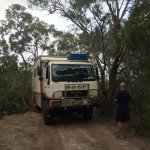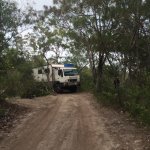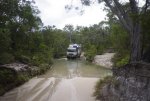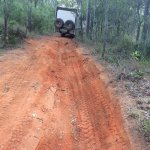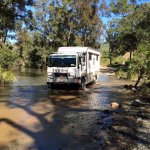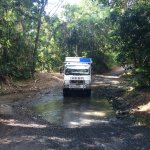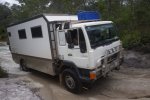Okay, I'm going to be the unpopular one here. . .
After many hours driving around in various places, I would say my top 10 priorities are:
1. Packing system (always number one on vehicle!)
2. Sleeping facilities
3. Camping equipment (includes cooking, washing, hygine etc)
4. Navigation systems
5. Tool and spares
6. Security systems
7. Water and fuel capacity
8. Vehicle ancillaries (including tires, suspension mods etc)
9. Medical systems (first aid kit etc.)
10. Packing system (always always always)
And here is my rationalization:
Anything you cannot get to easily on a long trip you will not use. I don't care if it is a spare part, a pot, insect repellant, etc. If it is not easy to get to, you will not use it until it is too late. For this reason, the single most important (and overlooked IMHO) modification is a packing system. Honestly, a stock TLC, Taco, Disco, Defender, Trooper, Patrol, etc could cross Africa if driven properly, but without a good packing system, the items you use for day to day life become a chore to get to. And let's face it, an 'expedition' (as presented here) is just living out of a car in variably unknown conditions for an extended period of time. Everything on my list is time based. You use a packing system all the time. From where you put your sunglasses, to where you put your matches, you use it every day and most of the time. And so, every 'expedition' vehicle will be unique, because everyone has different priorities and needs, so their packing system will vary. And you have to understand, packing systems to me includes everything you put on the vehicle. From where your conpressor is, to where your water is to where your clothes are, that is all part of 'packing' the vehicle (taking it away from stock) for your 'expedition'. Because of this, the packing system will take more planning and customizing than anything else on your vehicle.
Sleeping facilities will be used from 1/3 to 1/2 of the time. They have to be well planned out for how you use them and easy to set up and take down. I think a roof tent is perfect in this regard, but have had other overlanders laugh at the 3 minutes it takes for me to set up the tent. But that is 3 minutes I am willing to take, and so my solution is good for me, but not good for others. Your solution has to be good for you, or you will be frustrated.
Camping equipment includes cooking equipment, stuff for washing up afterwards, fire making, lights, etc. Again, you will use this stuff day in and day out. If it is not convienient after a hard day of driving, you will not use it. Once you do have it in hand, it should be easy to use and familiar to you. Sometimes the best stuff is that which is familiar to you, not the latest gizmo out of the store. Also, fuel choice for your camp stove should be something you can readily get wherever you plan to go. Some use LPG, I use gasoline, others use kerosene.
Navigation systems will be used everyday unless the area is familiar to you. They require a lot less planning and thought than a packing system, but are still very important. Take what you are used to, or learn what you plan to take.
Tools and spares. This comes from me driving a Land Rover, and maybe you Toyota guys will not need to think so much about it. Bottom line is you should know your vehicle inside and out. Anything that fails you should be able to diagnose whether you can fix it or not. You should be able to fix all common (and some less common) things that go wrong with the vehicle you chose to run with. Things that can be replaced on route like brake pads you should replace on route. Things that could go at any time like altenators, water pumps, belts, hoses, you should have a plan for--at least knowing how old and likely those pieces are to fail on your vehicle.
Security systems are a high priority in certain cases, and less so in others. If you are going into the 3rd world and places you have never been before, security should be a big factor. Given that your vehicle is your life-line on a VDE, then you should protect it and any equipment on it. This includes window protection, shades or curtains, keeping things out of sight, locking items on the outside down, a security/immobilizing system etc. Your security system should be tailored on how you operate, and you should know how to bypass any immobilizer in the event it fails in the immobilized condition.
Fuel and water capacity is important because it will limit your time away from re-supply. This is not something you will worry about every day, but on legs that are far from re-supply you should/will worry about them. And then there is the inevitable condition where the fuel and/or water you expected is not there. Then you should have a backup. Tom Sheppard suggests 25% backup on fuel. That is probably a bit much for most people under most conditions, but if you plan on crossing the sahara as Tom did, then use it! You cannot plan for every eventuality, but you can always have a reserve and a backup. Reserve could be the extra jerry can. Backup could be the 7 quarts of oil combined with the lamp oil and the stove gasoline which, mixed, will get a diesel running for a goodly distance.
Vehicle mods should only be undertaken for an expedition if you know how they work and are comfortable fixing them if they fail. Unfortunately, people who make aftermarket accessories for vehicles tend to test them less and/or under specific conditions that may or may not be what your vehicle will see. Suspensions that have been developed for off-road racing are very good at that, but may not be good for expedition vehicles which are heavily loaded and seeing less instantaneous-extreme but more time-additive-extreme conditions. All wiring should be done very carefully and connections should be soldered and well insulated. Know when cheap is acceptable and also when expensive is desirable.
Medical systems are very important, but they rate at the bottom of the list because they do not require that much thought. You have to take the training and get the gear, but I certainly didn't put as much thought into my medical pack as I did my packing system or my suspension for that matter. And of all things I spent time using on the trip, the medical pack was happily pretty low on the list.
As I said, everything is time based. The things you deal with most on a daily basis should be top priority for planning and design. My truck has a winch on it, but only because superwinch gave me a free one. I wouldn't pay to put one on my next expedition truck. Same with lockers, but then I do drive a truck with very good articulation. Same with a snorkel. I have no problem fording water, but I don't plan on doing the Camel Trophy either. And I have no problem washing out my K&N at camp, so the cleaner air argument doesn't really sell me on one. I have to say that I am sold on limb risers. They do work very well in the jungle and also give a convenient place to hang things to dry like dish towels.
Everyone is different, and every expedition is different. The best thing you can start with is knowledge. Know yourself, know where you are going and plan accordingly.
cheers
Graham
www.africaoverland.org
